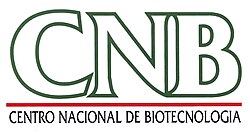Spanish National Center for Biotechnology (CNB)
 |
|
| Agency overview | |
|---|---|
| Formed | January 24, 1985 |
| Jurisdiction | Spain |
| Headquarters | Calle Darwin nº 3, Campus de Cantoblanco. 28049 Madrid |
| Employees | 676 (as December 2011) |
| Annual budget | 24 million € |
| Agency executive |
|
| Website | http://www.cnb.csic.es |
The National Center for Biotechnology (CNB) forms part of the Spanish National Research Council(CSIC), the largest public research institution in Spain.
The CNB was founded in 1992 to promote research in advanced biotechnology and molecular biology, and to act as a link between basic research and industrial applications.
The mission of the CNB is the generation of excellent scientific knowledge and its application to solving human and animal health issues, environmental, and agricultural challenges, whilst collaborating with industries and ensuring the transfer of technology.
The CNB is committed to the training of highly qualified personnel. It offers biotechnology-oriented counselling to companies and public institutions as well as an important communication of its scientific activity in specialized journals and press media.
The most relevant missions of the CNB are the following:
The CNB is a multidisciplinary research centre whose greatest efforts are concentrated in the areas of structural biology, molecular biology, virology, microbiology, plant biology, immunology and oncology, and systems and synthetic biology.
.
The CNB is a multidisciplinary research centre whose greatest efforts are concentrated in the areas of structural biology, molecular biology, virology, microbiology, plant biology, immunology and oncology, and systems and synthetic biology. In all cases, special emphasis is placed on transforming the knowledge generated into applications to benefit mankind.
Specific projects focus on structural biology of large macromolecules, genomics and functional proteomics, development of biocomputing tools, control of cell growth and cancer, mechanisms of aging and apoptosis, development of animal models for chronic autoimmune diseases, infectious and cancer-like diseases, construction of vaccines for humans and farm animals, development of tools to improve plant productivity and resistance to environmental stress, development of new processes for environmental recovery based on microorganisms, production of antibiotics and hydrolytic enzymes, and discovery of immunomodulatory compounds.
Finally, an overarching Program on Systems and Synthetic Biology provides computational and materials tools for modelling complex biological phenomena and reprogramming them in a biotechnological direction.
As a biotechnology center, the CNB also has important biotechnological production, and over the 2005-2009 period signed 225 research contracts with companies around the world (amounting to 37.4 M€).
During the same period, 87 patents were applied for, of which 33 were for new inventions; another 33 were applications for entry into the international PCT phase and the rest (21) mainly for European and US applications. Out of these, 13 patents have been licensed.
...
Wikipedia
